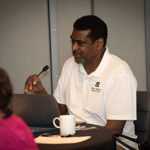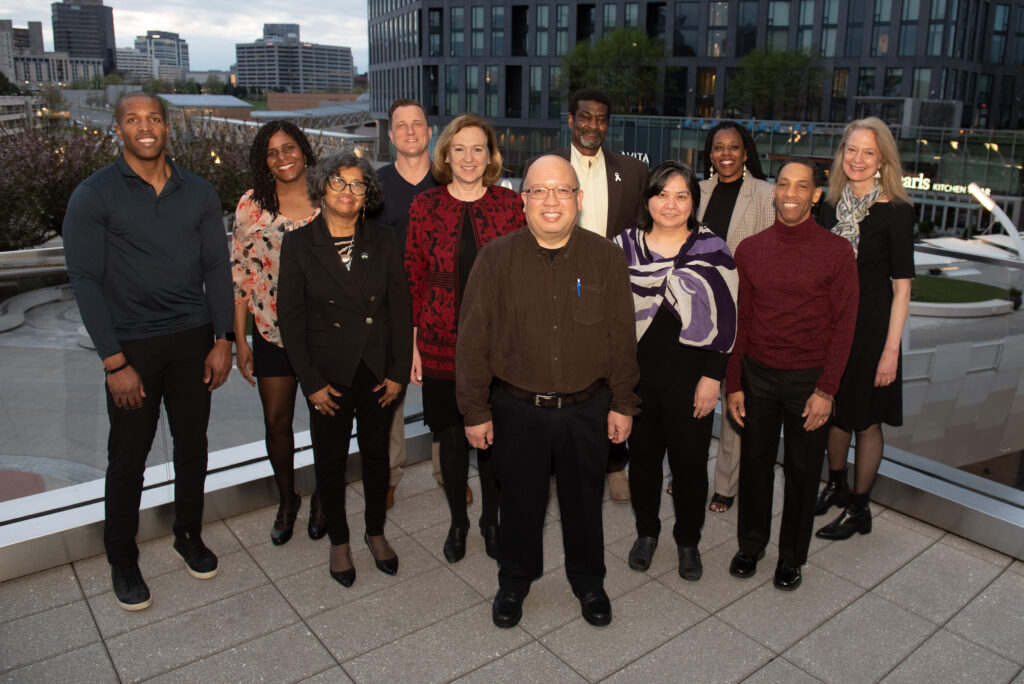Courageous conversations:
Social Work Workforce Coalition’s first meeting brings leaders together

Leaders of major social work organizations in the United States and Canada gathered in Northern Virginia, April 21–23, 2022, invited by ASWB as part of the association’s commitment to including more diverse voices in the examination development process. Participants in the first meeting of the Social Work Workforce Coalition also included consultants from the examination development program and Human Resources Research Organization, along with ASWB Exam Services staff members and communications advisors. The meeting combined education and interaction, fostering engagement in what one participant called “courageous conversations.”
The meeting began with presentations from ASWB staff and consultants on social work licensure, the role of ASWB, and the details of examination development. “You got into the nitty gritty of the exam program,” ASWB CEO Dwight Hymans told the coalition members as he closed the meeting. “You have learned more about our exam program than almost anyone else outside of ASWB. We invited you in so you could understand the complexity, the depth, and the breadth of the efforts that go into making this an equitable exam.”
Coalition members, in their own words
That strong knowledge base prepared coalition members for offering meaningful input into the demographic survey portion of the next analysis of the practice of social work. Called the Social Work Census, the survey is slated to launch March 2023, during Social Work Month. Coalition members also engaged in a discussion of emerging trends in social work to be included in the task analysis section of the census. The findings of the census will serve as the basis for the content outlines of the next round of licensing exams, which will launch in 2025.

Another of the coalition’s tasks was to provide input into the structure and content of community input sessions, or focus groups, on the licensing exams to be conducted later this year. Coalition members shared ideas about who should be invited to participate and what topics should be discussed.
Responses to a participant survey distributed after the meeting revealed that ASWB’s goals for the gathering were met. Nearly all participants reported that their understanding and opinion of the social work licensing exams had improved. Similarly, almost all participants agreed that ASWB’s examination development process helps to ensure that the exams are fair and uniform for all.
We are in a space of having open hearts and minds, and we are listening to you and the larger social work community.
A second coalition meeting is scheduled for August. By then, ASWB will have publicly released examination performance data as part of its commitment to data equity and transparency. The agenda includes time for an open discussion of the findings of the data analysis. Coalition member will offer input on exam initiatives as the association continues to work toward the strategic framework goal of educating stakeholders about the licensing exams. Decision-making will also be on the agenda as the coalition continues in its leadership role in the implementation of the Social Work Census.
“We are in a space of having open hearts and minds, and we are listening to you and the larger social work community,” Lavina Harless, senior director of examination services, told the coalition. That listening and learning is taking place in the Social Work Workforce Coalition meetings and the community input sessions. Those efforts will lead to the development of the Social Work Census in 2023, an inclusive tool for learning as much as possible about the social work profession. “Let’s find out where the profession is,” Harless said, “and let’s figure out how we can do this together.”

